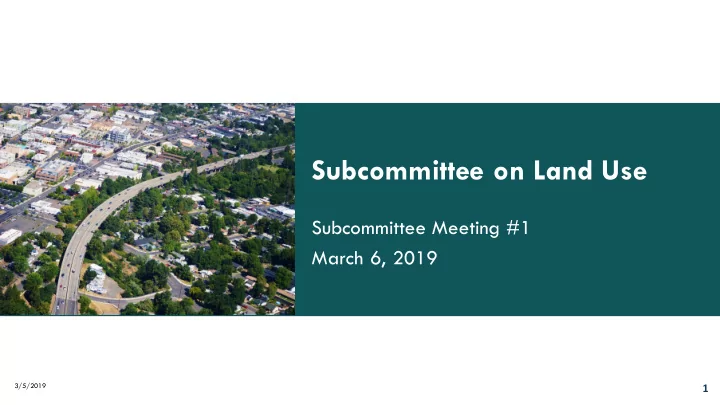

Subcommittee on Land Use Subcommittee Meeting #1 March 6, 2019 3/5/2019 1
Welcome and Introductions 3/5/2019 2
Results from Previous Scoping 3/5/2019 3
Resources • Lessons from automation in farming Planning • Consider potential impacts on state goals: – Goal 2: Land Use Planning – Goal 3: Farmland – Goal 4: Forest land – Goal 6: Air, Water, Land Resources Quality – Goal 10: Housing – Goal 12: Transportation – Goal 13: Energy conservation – Goal 14: Urbanization • How can AVs help achieve existing transportation and other planning goals? 3/5/2019 4
Planning • Changes in building codes, permitting, transportation improvements, parking, zoning, development codes, etc. • Transportation data/information needed to make good land use decisions • Changes to UGB analysis and update of EOAs, HNA, and BLI • Impacts dependent on use of private vehicles vs. shared fleets • Urban vs. rural impacts • Role of DLCD in policy 3/5/2019 5
Potential Changes to Land Use Patterns • Distribution of adverse land uses (car waste dumps, distribution centers, parking/charging lots) • Transfer centers where goods moved from long-haul trucks to local delivery vehicles • Reduced need for parking in cities may allow parking lots to be converted to other uses • Will AVs be stored at people’s houses or in shared lots? • AVs may create opportunities to increase mixed use density • Correlation to current Goal 10 changes • AVs could create pressures to sprawl, making transit and livable communities more diffic ult 3/5/2019 6
Electric Vehicles • Energy production and EV charging, microgrids, etc. Congestion and VMT • Potential for increased congestion if cars circulate instead of park • Zero occupancy vehicles • VMT and AVs • Curb management 3/5/2019 7
Funding • Pricing—who pays for roads? • Pricing the curb • Changes to system development charges 3/5/2019 8
Materials from 2018 Task Force Report 3/5/2019 9
Presentations at the Long-Term Policy Workshop, August 2018 Becky Steckler , University of Oregon Eric Hesse, Portland Bureau of Transportation 3/5/2019 10
Memos from Subcommittee on Cybersecurity and Long-Term Policy Desired Data to Guide AV Policy AV Policy Furthering Oregon’s Development Transportation, Land Use, and Global Warming Pollution Reduction Goals and Economic Development Principles Carrie MacLaren, DLCD and Becky Steckler , UO Becky Steckler , UO 3/5/2019 11
Efforts in Other Jurisdictions 3/5/2019 12
State and Local Efforts on Land Use • Is anyone aware of other state-level approaches to AVs and land use? • Bloomberg: At least 123 cities across the world are working to allow testing or build AVs into future plans • City of Portland has adopted policies into its Transportation System Plan and allows for AV testing 3/5/2019 13
Additional Initiatives to Track? 3/5/2019 14
Subcommittee Scope and Final Product 3/5/2019 15
Possible Final Product Goals Form of Product (discussion) 1. Status update and identification of critical issues or 2. Recommendations on particular issues Issue Areas (discussion) • Critical data to request from AV companies to assist in land use planning • Alignment + incentives for AVs to further Oregon’s land use planning and global warming goals • Pricing: policies for occupancy pricing and road pricing 3/5/2019 16
Public Comment 3/5/2019 17
Recap and Next Steps 3/5/2019 18
Recommend
More recommend